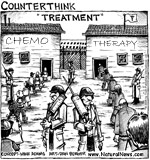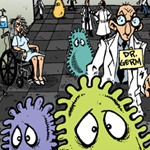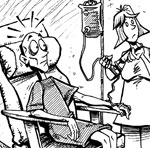Seven Things Men and Women Need to Know About Vitamin E as a Cancer-Fighter
| Share on Facebook | Share on Twitter | Share on Google+ |
Scientists have been investigating the power of vitamin E as a cancer-fighting agent since the early 1950's. There was a time in the middle of the 1990's, however, that research almost stopped. In 1994, Finnish scientists, who turned out to be studying a group of Finnish smokers in whom the cancer process had already begun, got preliminary results suggesting that low doses of beta-carotene and vitamin E might even increase the risk of the disease.
For over a year the headlines read that vitamin E was not a supplement to take to prevent cancer, but then it was discovered that the problem in the Finnish Alpha-Tocopherol, Beta-Carotene Study was not vitamin E at all.
It turned out that the culprit in the Finnish study was beta-carotene, and only when beta-carotene was taken without other beneficial carotenoids such as alpha-carotene, gamma-carotene, lycopene, lutein, and zeaxanthein.
Vitamin E, however, turned out to have potent cancer-fighting capacity. But the important finding of recent scientific research is that the alpha-tocopherol form of vitamin E is not enough to fight every kind of cancer. Gamma-tocopherol and tocotrienols, which are only available in their natural form, are also need for full cancer protection.
Here is a summary of the ten most important findings of recent research of vitamin E and cancer:
1. Men who smoke and who also take 100 IU of alpha-tocopherol every day for at least six years have 32 per cent lower rates of prostate cancer diagnosis and 41 per cent lower rates of prostate cancer death.
2. Animals fed gamma-tocopherol have lower rates of oncogene ras-P21 activation, a sign of lower risk of colon cancer.
3. Animals exposed to liver toxins develop liver cancer less often when they are fed a mixture of vitamin E tocopherols and tocotrienols. This suggests that while alpha-tocopherol is important for fighting cancer, the other seven forms of vitamin E work block different pathways that can result in liver cancer.
4. Dr. Kedar Prasad of the University of Colorado and Dr. Kimberley Kline of the University of Texas at Austin have found that the off-the-shelf form of vitamin E known as d-alpha-tocopheryl succinate slows the growth of breast cancer cells. The natural vitamin E (alpha-tocopherol) and the natural sugar acid (succinate) together have a cancer-fighting ability that neither has separately. In this case, "natural" isn't actually best. Chemically modified vitamin E is better, but this is the form of vitamin E you are most likely to find in the least expensive supplements.
5. For people with cancer who choose to have chemotherapy, vitamin E can fight side effects. One of the worst complications of some forms of chemotherapy is mucositis, terrible mouth sores that make eating and drinking difficult. Malnutrition and dehydration caused by the mucositis can and often do undermine the benefits of the chemotherapy. Taking vitamin E, vitamin C, and selenium reduce this side effect of chemotherapy.
6. Getting into the habit of taking vitamin E supplements before menopause does the most good for preventing breast cancer in women. Consuming just the minimum recommended daily intake of vitamin (what you would get in a multivitamin) can result in up to 90 per cent lower rates of breast cancer in women who have a family history of breast cancer. Most women get gamma-tocopherol in food, so the most important cancer-fighting supplement is the common, inexpensive alpha-tocopherol.
7. Vitamin E can be very helpful in preventing stomach cancer, especially if you have lived in a countries that frequently have contamination with the ulcer-causing bacterium H. pylori in municipal water supplies.Central America has a special problem with this particular stomach bug. A combination of antibiotics (or use of deglycyrrhizinated licorice products) to fight low-grade stomach infections and vitamin E greatly reduces stomach cancer risk.For preventing and fighting cancer, you need more vitamin E than you can get from a multivitamin, but you don't need a megadose. Most experts, such as Dr. Kline, suggest a combination of 200 IU of alpha-tocopheryl succinate and 200 mg of natural tocotrienols, usually four capsules a day.
Selected References:
London S.J., et al. Carotenoids, retinol, and vitamin E and risk of proliferative benign breast disease and breast cancer. Cancer Causes & Control 3 (1992) 503-512.
Schwenke D.C. Does lack of tocopherols and tocotriemols put women at increased risk of breast cancer? Journal of Nutritional Biochemistry 13 (2002) 2-20.
Wu D, et al. In vitro supplementation with different tocopherol homologues can affect the function of immune cells in old mice. Free Radic Biol Med 2000 Feb 15;28(4):643-51.
-
Skin CareMen Skin Care
-
Free ResourcesFree eBooks
-
Every human being is the author of his own health or disease.Buddha
-
Featured Health SupplementAll ingredients are assessed at molecular level to ensure synergy, safety and effectiveness.
 This is crucial because when some ingredients are combined they will help create other substances in the body.
This is crucial because when some ingredients are combined they will help create other substances in the body.
-



















